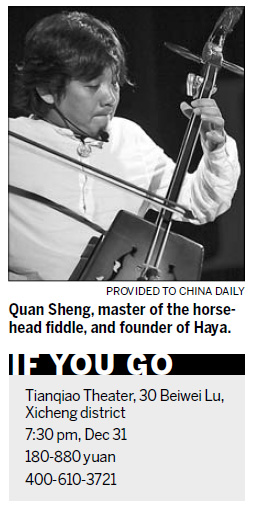Magic of Mongolian music
Updated: 2011-12-25 08:07
By Chen Nan(China Daily)
|
|||||||

Beijing
Mongolians have been nomadic herders for as long as they can remember. Much of their musical tradition comes from this itinerant lifestyle, and to this day, Inner Mongolian musicians still find inspiration from the annual seasonal migration to find better pastures.
It is no different for Quan Sheng, a man many consider to be the best horse-head fiddle player in China. He is also the founder of Haya Band, a group of musicians made up of friends and students who got together to promote Mongolian music. The band has now attracted attention both at home and abroad.
"I have been told many tales about migration since I was born. The horses are tied to wooden stakes. When the herders leave, they have to fill the hole in the ground.
"If they don't, demons underground will come out and destroy our grassland and our souls," Quan recalls.
And that is why Haya Band has reached back to their shared Mongolian heritage and named their fourth and latest album Migration, a musical narration of traditions and rites. To promote this release, the band is presenting a concert on Dec 31 at the Tianqiao Theater.
"Migration of animals and people are seasonal journeys that obey natural rules. It's a tradition which runs in our blood," Quan says. "We've toured around the world in 2011 and we've found that international audiences are very interested in our culture. Now, we bring it back to China and share it with our brothers and sisters."
The concert will have traditional Mongolian musical elements including the horse-head fiddle, long chanting, throat singing and Mongolian shaman dance. It will also incorporate world music, drawn from African percussion, Indian drums and Indian flutes.
Quan has played the horse-head fiddle for more than 20 years, and he has created an academic major for students to study the instrument at the Central University for Nationalities in Beijing, the first time a tertiary institution has offered such a course.
The versatile singer-songwriter rose to fame in 2007 with his score for director Zhang Yimou's film, Riding Alone for Thousands of Miles.
Then he founded Haya and the group released its debut album Wolf Totem, which blended indigenous and original Mongolian sounds with modern music. It won the Best Crossover Album award at the Taiwan Golden Melody Awards.
Haya's other members also come from the Inner Mongolia autonomous region.
There's percussionist Bao Yin, who is also adept at hoomii, the distinctive Mongolian "throat singing", guitarist Xi Bo, and leading vocalist Daiqing Tana, all of whom have made Haya a unique musical group in China.
Daiqing Tana, 30, a Mongolian from Qinghai province, joined the band with their second album, Silent Sky, adding the feminine element to the group.
The third album, Light, was dedicated to the victims of the 2008 earthquake in Sichuan.
You may contact the writer at chennan@chinadaily.com.cn.
China Daily
(China Daily 12/25/2011 page15)